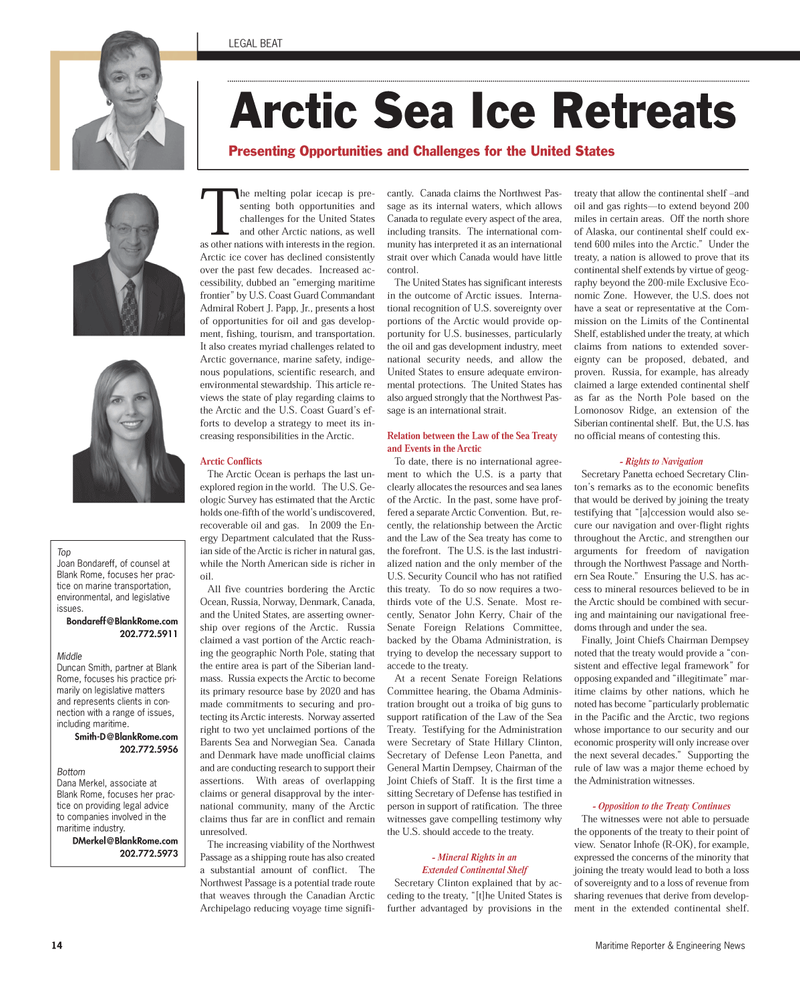
Page 14: of Maritime Reporter Magazine (July 2012)
Arctic Operations
Read this page in Pdf, Flash or Html5 edition of July 2012 Maritime Reporter Magazine
14Maritime Reporter & Engineering News LEGAL BEAT Arctic Sea Ice Retreats Presenting Opportunities and Challenges for the United States The melting polar icecap is pre-senting both opportunities andchallenges for the United Statesand other Arctic nations, as well as other nations with interests in the region. Arctic ice cover has declined consistently over the past few decades. Increased ac- cessibility, dubbed an ?emerging maritime frontier? by U.S. Coast Guard CommandantAdmiral Robert J. Papp, Jr., presents a host of opportunities for oil and gas develop- ment, fishing, tourism, and transportation. It also creates myriad challenges related toArctic governance, marine safety, indige- nous populations, scientific research, and environmental stewardship. This article re- views the state of play regarding claims to the Arctic and the U.S. Coast Guard?s ef- forts to develop a strategy to meet its in- creasing responsibilities in the Arctic. Arctic Conflicts The Arctic Ocean is perhaps the last un- explored region in the world. The U.S. Ge- ologic Survey has estimated that the Arctic holds one-fifth of the world?s undiscovered, recoverable oil and gas. In 2009 the En- ergy Department calculated that the Russ- ian side of the Arctic is richer in natural gas, while the North American side is richer in oil. All five countries bordering the Arctic Ocean, Russia, Norway, Denmark, Canada, and the United States, are asserting owner- ship over regions of the Arctic. Russia claimed a vast portion of the Arctic reach- ing the geographic North Pole, stating thatthe entire area is part of the Siberian land-mass. Russia expects the Arctic to become its primary resource base by 2020 and hasmade commitments to securing and pro-tecting its Arctic interests. Norway asserted right to two yet unclaimed portions of the Barents Sea and Norwegian Sea. Canada and Denmark have made unofficial claims and are conducting research to support theirassertions. With areas of overlapping claims or general disapproval by the inter- national community, many of the Arctic claims thus far are in conflict and remain unresolved. The increasing viability of the NorthwestPassage as a shipping route has also created a substantial amount of conflict. The Northwest Passage is a potential trade route that weaves through the Canadian Arctic Archipelago reducing voyage time signifi- cantly. Canada claims the Northwest Pas- sage as its internal waters, which allows Canada to regulate every aspect of the area, including transits. The international com- munity has interpreted it as an internationalstrait over which Canada would have little control. The United States has significant interests in the outcome of Arctic issues. Interna- tional recognition of U.S. sovereignty over portions of the Arctic would provide op- portunity for U.S. businesses, particularly the oil and gas development industry, meet national security needs, and allow the United States to ensure adequate environ- mental protections. The United States has also argued strongly that the Northwest Pas- sage is an international strait. Relation between the Law of the Sea Treaty and Events in the Arctic To date, there is no international agree- ment to which the U.S. is a party thatclearly allocates the resources and sea lanesof the Arctic. In the past, some have prof- fered a separate Arctic Convention. But, re- cently, the relationship between the Arctic and the Law of the Sea treaty has come to the forefront. The U.S. is the last industri- alized nation and the only member of theU.S. Security Council who has not ratified this treaty. To do so now requires a two- thirds vote of the U.S. Senate. Most re- cently, Senator John Kerry, Chair of the Senate Foreign Relations Committee, backed by the Obama Administration, is trying to develop the necessary support to accede to the treaty. At a recent Senate Foreign Relations Committee hearing, the Obama Adminis- tration brought out a troika of big guns tosupport ratification of the Law of the Sea Treaty. Testifying for the Administration were Secretary of State Hillary Clinton,Secretary of Defense Leon Panetta, and General Martin Dempsey, Chairman of the Joint Chiefs of Staff. It is the first time a sitting Secretary of Defense has testified in person in support of ratification. The three witnesses gave compelling testimony why the U.S. should accede to the treaty. - Mineral Rights in an Extended Continental ShelfSecretary Clinton explained that by ac- ceding to the treaty, ?[t]he United States is further advantaged by provisions in the treaty that allow the continental shelf ?and oil and gas rights?to extend beyond 200 miles in certain areas. Off the north shore of Alaska, our continental shelf could ex- tend 600 miles into the Arctic.? Under the treaty, a nation is allowed to prove that its continental shelf extends by virtue of geog- raphy beyond the 200-mile Exclusive Eco- nomic Zone. However, the U.S. does not have a seat or representative at the Com- mission on the Limits of the ContinentalShelf, established under the treaty, at which claims from nations to extended sover- eignty can be proposed, debated, andproven. Russia, for example, has already claimed a large extended continental shelf as far as the North Pole based on the Lomonosov Ridge, an extension of the Siberian continental shelf. But, the U.S. hasno official means of contesting this. - Rights to NavigationSecretary Panetta echoed Secretary Clin- ton?s remarks as to the economic benefits that would be derived by joining the treaty testifying that ?[a]ccession would also se- cure our navigation and over-flight rights throughout the Arctic, and strengthen our arguments for freedom of navigation through the Northwest Passage and North- ern Sea Route.? Ensuring the U.S. has ac- cess to mineral resources believed to be in the Arctic should be combined with secur- ing and maintaining our navigational free- doms through and under the sea. Finally, Joint Chiefs Chairman Dempsey noted that the treaty would provide a ?con- sistent and effective legal framework? for opposing expanded and ?illegitimate? mar- itime claims by other nations, which henoted has become ?particularly problematicin the Pacific and the Arctic, two regions whose importance to our security and oureconomic prosperity will only increase over the next several decades.? Supporting the rule of law was a major theme echoed by the Administration witnesses. - Opposition to the Treaty Continues The witnesses were not able to persuadethe opponents of the treaty to their point ofview. Senator Inhofe (R-OK), for example, expressed the concerns of the minority that joining the treaty would lead to both a loss of sovereignty and to a loss of revenue from sharing revenues that derive from develop- ment in the extended continental shelf. Top Joan Bondareff, of counsel at Blank Rome, focuses her prac-tice on marine transportation, environmental, and legislative issues. [email protected] 202.772.5911MiddleDuncan Smith, partner at Blank Rome, focuses his practice pri-marily on legislative mattersand represents clients in con- nection with a range of issues,including [email protected] Merkel, associate atBlank Rome, focuses her prac-tice on providing legal advice to companies involved in themaritime industry. [email protected]#7 (10-17):MR Template 7/6/2012 10:01 AM Page 14

 13
13

 15
15
